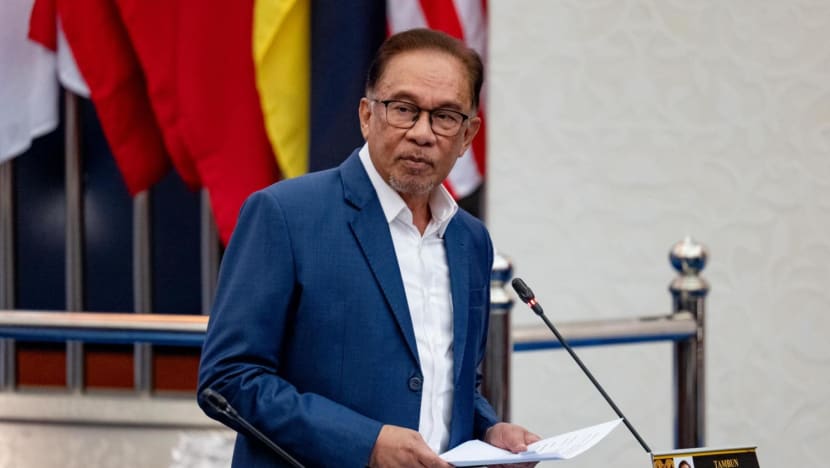CNA Explains: What might be the potential areas of focus in Malaysia’s updated budget for 2023?

Prime Minister Anwar Ibrahim, who is also Malaysia's finance minister, will unveil the country's 2023 Budget on Feb 24, 2023. (Photo: Facebook/Anwar Ibrahim)
KUALA LUMPUR: Malaysia’s unity government will table its first federal budget in Parliament on Friday (Feb 24). This comes on the heels of a “mini-budget” that was passed in December last year that allowed for certain provisions such as civil servant salaries, healthcare and education services to be funded until the new budget for 2023 is passed.
Prime Minister Anwar Ibrahim, who is also the finance minister, has said that the new budget will not be linked to the one that was put forth in October by the previous administration.
The previous budget, which was tabled by then-finance minister Tengku Zafrul Tengku Abdul Aziz, was neither debated nor approved in parliament. This was because the lower house was dissolved three days after the budget was tabled to make way for the 15th General Elections (GE15).
CNA revisits the circumstances that resulted in the need to table a second budget this year, as well as the possible areas of focus.
WHY A NEW BUDGET HAS TO BE TABLED
Former finance minister Tengku Zafrul tabled a budget for 2023 in October last year with a government spending plan involving RM372.3 billion (US$80.06 billion). About RM272.3 billion was allocated for operating expenditure and RM95 billion for development expenditure.
However, it lapsed after then-prime minister Ismail Sabri Yaakob announced that parliament had been dissolved to pave the way for GE15 on Nov 19. At that time, Mr Ismail Sabri said that he would implement all of the initiatives in the 2023 budget should he be given the mandate as prime minister again.
"If someone else takes over, I can't guarantee what has been promised. There is a difference between the budget tabled (but not approved yet) and (an election) manifesto which is a promise,” Mr Ismail Sabri had previously said.
Five days after his coalition won the most seats in the general elections. Mr Anwar was sworn in as prime minister. He then unveiled a new Malaysian Cabinet on Dec 3, with him holding the finance portfolio.
Following this, Mr Anwar said that the unity government will look at the proposals in the budget tabled by the previous administration before making changes to it. A mini-budget was then tabled and approved in Parliament in December to ensure smooth operations of the government until the new budget is passed.
The mini budget allows for funds amounting to RM107.7 billion to be drawn from the consolidated fund to meet urgent spending needs for the first six months of 2023.
A SMALLER BUDGET?
Mr Anwar has hinted to local media that allocations under Budget 2023 may be “reduced” though he said that this will not affect Malaysia’s development programmes.
In a press conference earlier this month following a regular Cabinet meeting, Mr Anwar said that the country “cannot sustain a high deficit”.
“I tabled the budget strategies and preliminary figures because the country cannot sustain a high deficit.
“We will cut where possible and this reduction will not put a strain on our development programmes,” Mr Anwar reportedly said, without elaborating on what the cuts may be.
Earlier in January, Mr Anwar said that Malaysia’s national debt has reached RM1.5 trillion. He added that the figure, which includes liabilities, has already exceeded 80 per cent of the gross domestic product (GDP) and that this has a direct impact on the economy.
Mr Anwar has since stressed that the government will carry out measures to reduce the country’s deficit and to ensure that its debt liability ratio to the GDP was under control, the Star reported.
Economist Khor Yu Leng, Southeast Asia research director at Segi Enam Advisors, told CNA that a “leaner fiscal budget is needed to better manage Malaysia’s large national debt”.
“But if it is not politically possible (to do so), Anwar has to ensure that development spending is corruption-free and that it is effective in generating economic multipliers,” said Ms Khor.
Political analyst Oh Ei Sun added that while cutting back on government expenditures is ideal, it is “easier said than done because Malaysia is a developing country”.
“Therefore, you need a lot of expenditure for development but what (the government) can do for example is perhaps adjust a little bit of the proportion for the administrative expenditure versus the developmental expenditure,” said Dr Oh, a senior fellow at the Singapore Institute of International Affairs.
“Right now … it’s 80 per cent for administrative spending paying all the government salaries and so on and only 20 per cent (allocated) for development. If you could subtly tweak or adjust the ratio … I think that would help.
“And in the longer run, it would propel Malaysia hopefully to a more developed status,” said Dr Oh.
BUDGET 2023 TO FOCUS ON DRIVING GROWTH: ANWAR
At a monthly gathering with the finance ministry earlier this month, Mr Anwar said that the Budget 2023 he is tabling aims to attract investments and drive the country’s growth while taking into account the current economic challenges.
Malaysia’s central bank governor Nor Shamsiah Mohd Yunus said on Feb 10 that economic growth this year is expected to be at a more moderate pace after coming off a strong recovery last year.
“For 2023 growth, domestic demand will remain as a key driver of growth given the slowing global demand. I wish to stress that Malaysia will not go into a recession this year.
“However, a highly challenging and uncertain global environment will remain the key risk to domestic growth going forward,” Mdm Nor Shamsiah had said.
Mr Anwar, who is also the Tambun MP, has said that the 2023 budget will focus on the green and digital economies as well as on small and medium enterprises (SMEs). These sectors, he said, are critical in light of the current economic slowdown as a result of factors such as the Russia-Ukraine war.
“We should not brood about an economic downturn, but instead look for ways (to grow). Firstly, we can focus on the green economy, and second, on digital (economy) … Our approach thus far has also not focused on SMEs – which form the backbone of our economy.
“So in this year’s budget, we will focus on these sectors,” said Mr Anwar during a keynote speech at the 2023 Budget Dialogue. The session was held at the finance ministry and was attended by stakeholders such as government agencies, the private sector, academia and civil society.
Separately, Mr Anwar had said that the government will continue to control inflationary pressures and ease the public’s burden due to the high cost of living through the upcoming budget, local media had reported.
However, in the wake of the COVID-19 era spending drive under the previous administrations, Mr Anwar had warned of fiscal prudence to tackle Malaysia’s rising debt level.
Bloomberg reported that Malaysia has seen its budget strained due to the cost of keeping essentials at below-market prices, with government subsidies forecast to reach a record RM80 billion in 2022.
Earlier this month, the World Bank recommended that the unity government look into strategies for targeted subsidies in its upcoming budget.
“The biggest expenditure saving for the government would come from subsidy rationalisation; 2.3 per cent of GDP is spent on just fuel subsidy, which is way more than 1.9 per cent of GDP spent on the Ministry of Health's budget.
“Putting in plans to phase out blanket, broad-based subsidies and moving towards a more targeted subsidy framework that would benefit lower-income households is relevant and timely,” said the World Bank’s lead economist for Malaysia Apurva Sanghi.
Dr Oh, the political analyst, agreed that subsidies rolled out by the government should be more targetted.
“For example, instead of subsidising fuel (for everyone), perhaps you will have coupons for the B40 group - the more hard-to-do Malaysians and so on - so that these subsidies could be more targetted,” he said.
Ms Khor, the economist, agreed that while subsidy rationalisation should be done, it may be “too soon” for the government to deliver on such reforms with just less than three months in office.
“Experts are of the view that targeted subsidies can trim RM10 to 15 billion from an estimated RM50 to 60 billion. These savings can be better invested in education and health.
“So rigorous planning needs to start now, so that reforms can be unveiled in Budget 2024 (later this year), including a better subsidy system,” said Ms Khor.
ADDITIONAL REPORTING RHEA YASMINE BTE ALIS HAIZAN



















